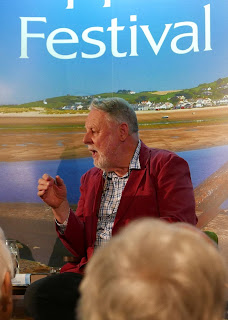Sunday, 25 October 2015
Terry Waite
Well, I finally got to meet him. Terry Waite, humanitarian, writer and campaigner, hostage negotiator, one-time Special Envoy to the Archbishop of Canterbury, and forever famous for being held as a high-profile hostage in Lebanon from 1987 to 1991, the first four years of that in solitary confinement. The last fact is a crucial one. How did he survive the poor conditions, the deprivation of human contact? It argued immense inner resources. He seemed to epitomise the notion of 'no surrender' - not a violent defiance, but a calm one, impressive and inspirational in his patience and refusal to despair - and I had always been keen to meet him if ever I could.
Actually, I saw him twice in the same evening. First, at his public talk on his life and work (and - very incidentally - his writing career and latest book) in the Parish Church in Appledore.
Second, at the reception one hour later in an Appledore art studio, open only to Friends of the Appledore Book Festival - and I was a Friend. I arrived a little late from the other end of town. Not wanting to beat about the bush, I went straight up to him and said 'Mr Waite! How very tall you are!' Which was no less than the truth. He is aged 67, and is a dizzying 6 foot 7 inches tall (quite a coincidence in figures, that).
I had a question ready for him, which I didn't think anybody would have asked. I'd noticed that he was a patron of the Romany Society. I knew this had nothing directly to do with gypsies - 'Romany' was the pen-name of George Bramwell Evens, a countryside-loving Methodist minister, wayfarer, writer and radio broadcaster of the 1930s. I asked him why he had become patron. He explained that he'd always had a love of the countryside since a child, and Romany's appreciation of rural plants and animals appealed to him.
He must have been surprised at my question. It wasn't about Christianity, nor the Middle East, nor some aspect of being a long-term hostage. I had done my homework, and in fact did have some other questions, such as what had been the special thing about Christianity that had called to him and sustained him; whether he thought the decline of religious feeling in the UK threatened the recruitment of people like himself to the cause of peace; whether he thought America should stay out of the Middle East, having such a toxic record there; why Russia might think itself more acceptable; and what had been the key psychological techniques for enduring solitary confinement - had he treated it as something akin to a hermit's retreat? But instead I asked him about Romany.
Somewhere in my photo archives (it isn't where I thought it was) I have a picture of the dust cover of a book written by Romany titled Out With Romany Again, implying of course that it was a sequel to an earlier book titled Out With Romany. Well, there was the author, sitting near his horse-drawn caravan, stroking his faithful dog Raq. His clothes looked a bit dishevelled, the collar of his shirt all askew; but it didn't matter. This was a man at peace with himself, and at one with country life, promising to share his experiences with the reader. I wonder if Terry Waite thought about the gentle green countryside of his Cheshire boyhood, when confined in a tiny room somewhere in Beirut - bookless, without pen and paper, and only his thoughts to draw upon; or when dumped in a car's boot to be moved - bound, gagged and blindfolded - from one hideout to another; or when threatened at impossibly short notice with death by shooting - as he was more than once. (What would I have thought of, if ever faced with the same?)
I didn't have long with him at the studio. He was besieged by other people wanting their own moment with him. He was bulky to match his height, making all the other men look small. His captors all those years ago must have found him impossible to intimidate. He actually went back to see them in 2012, to reach out to them and heal the past. Not many would have done that. A big, big man. Look how he stood head and shoulders above everyone else at the studio:
Earlier on, at the church, on the stage there, he hadn't seemed quite so tall. But still impressive. He was introduced by the vicar, dressed casually for the occasion.
Terry Waite described his experiences as a hostage negotiator, and later on as a hostage himself, at some length. Although he did mention how he physically deteriorated at the time, it had not left him bent and gaunt in his older life. Far from it. He seemed outstandingly robust. And there seemed to have been no lasting mental damage. As you can see, he could smile and make easy jokes; and in fact his latest book was an experiment in humour. But I thought that basically he was a very serious man, very much committed to the humanitarian causes and principles he had always championed.
I didn't buy his book. For one thing, no matter how funny it was, I hadn't got a sense of humour and it would therefore have been a waste of money in my hands. For another, I wanted to get a quick meal. It wasn't as quick as I hoped, and I had to eat it at the bar, in conversation with a local artist-photographer called Pete. It was a big plate of pub grub.
I managed to eat it all. I don't think Terry Waite would have detected my chip-breath.












